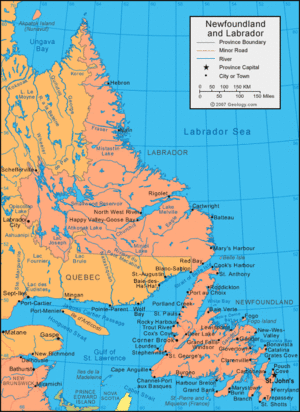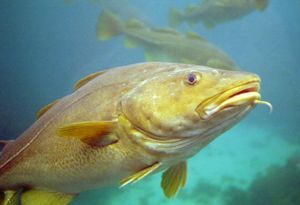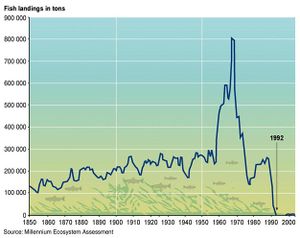The tragedy of the commons: Is the Newfoundland's cod crisis a good example?
Contents
Introduction
The 1992 moratorium on fishing for Northern Cod (Gadus morhua), announced by the Canadian Federal Minister of Fisheries and Oceans, marked a symbolic end to the way of life that had sustained Newfoundland’s outports for hundreds of years. It also marked the completion of an ecological regime shift, from an ocean ecosystem dominated by cod and other predatory groundfish, to one in which such fish are comparatively scarce, and lower-trophic-level invertebrates more common. Around 19,000 fishers and workers related to fishing activities were directly affected and up to 20,000 other jobs were lost or harmed[1].
The Tragedy of the Commons
One of the better-known theories of resource use, which might be applicable to the Newfoundland fishery, is the tragedy of the commons theory. Since it was first expounded by Garrett Hardin in 1968, the tragedy of the commons has been a popular theory in regards to common property. As part of this theory, assets such as fish, forest, or water resources are seen as "common property" - resources which can be used by anyone, yet no one truly owns. When the users of the same common property compete, leading to an unsustainable situation, the tragedy of the commons appears.
Fishery in the tragedy of the commons scenario
Following Ophuls' model of a fishery in the tragedy of the commons, once the critical point was reached, either privatization or collapse would occur. It is easy to see how the collapse of the Newfoundland fishery could have been a tragedy of the commons, with the many groups and countries that were taking from the resource base. Given the conditions necessary for a tragedy of the commons, and its ultimate outcome, the Newfoundland cod stock collapse would then have to be considered inevitable and unavoidable. However, the proposition that the Newfoundland's cod crisis fits in the tragedy of the commons is not accepted by many environmental specialists, due to its simplistic arguments[2].
Overfishing
Many authors have cited overfishing as the cause of the cod stock collapse[3][4][5]. In the case of the Newfoundland cod, there were three distinct groups involved in harvesting the resource: local inshore fishermen, Canadian draggers and trawlers, and deep-sea foreign fishing vessels.
Critique of the Tragedy of the Commons Model
The tragedy of the commons is a simplistic and fairly abstract model. Factors such as regulating mechanisms and community sanctions are not accounted for in the theory, as the assumption is made that common property means open access to all[6]. Many assert that what the theory describes is not a true commons, but an open access regime or free-for-all situation, where no authority has any control[7]. One would be hard pressed to find a scenario where a natural resource is being used and a true free-for-all situation exists, particularly in the more populated areas of the world. In most instances of resource exploitation the state plays a regulatory role, in order to maximize the capital gains from the resource and ensure conservation[8]. The inevitability of the tragedy of the commons theory then becomes questionable, as these regulatory mechanisms are not accounted for. In the case of the Northwest Atlantic fishery, the state (the Canadian Federal government) was heavily involved in the regulation and management of the fishery, primarily through the federal Department of Fisheries and Oceans (DFO). The role of government management/mismanagement is crucial to the discussion of the Newfoundland fishery and its collapse.
Government Management
The government's involvement in the fishery is best explained by a statement made by Sinclair (1992)[9], "Since 1977, the Government of Canada has been the manager of the fisheries. Instead of fish being a resource available to anyone with the means to catch them [i.e. a commons], they became state property, the rights to which were delegated in the management plans. Therefore, the management policy of the Canadian state has become a major factor in the condition of the industry since this time" (p. 93). The Federal government, through the DFO, controlled the number of fishermen through licensing systems, set quotas for different types of vessels, and, acting upon information from its own scientists, set the Total Allowable Catch (TAC) for the industry each year[10][11]. So quite obviously, a lot of the blame for the overfishing has to be placed there, as the DFO told the fishermen what they could go out and get. Acting upon faulty data , the DFO licensed too many fishermen and set TAC's that were too high[12].
The Tragedy of State Mismanagement
As the exploitation of the Newfoundland fishery was so predominantly guided by the government, the (mis)management of the fishery and its subsequent collapse match well with ideas put forth by Marchak (1987)[13] in her book Uncommon Property. McGraw (1996) calls this "the tragedy of state mismanagement" theory (unit 4, p. 3). In her book, Marchak argues that a fishery is not a true commons, as the fisher lacks management rights normally associated with property and common property. The state has appropriated the property, and makes all of the management decisions. Fishermen get told who can fish, what they can fish, and essentially, what to do with the fish once it is caught. In this regard then, when a resource such as the Newfoundland fishery collapses, it is more a tragedy of state mismanagement than a tragedy of the commons.
Other environmental factors that have been implicated include greater predation of cod by seals because of the decreased seal hunt, and an increase in the mortality of capelin, one of the cod's main food sources[14]. Many of these environmental factors had impacts on the Cod stocks, but one must still look back to government mismanagement and overfishing as primary causes. This is not to discount environmental factors, but to suggest that they probably factored in at the most inopportune time[15].
See also
Internal links
The Tragedy of the Commons - The Tuna Example
Effects of fisheries on marine biodiversity
EU Common Fisheries Policy (CFP)
External links
Further reading
Robert J. Smith (1981) Resolving the Tragedy of the Commons by Creating Private Property Rights in Wildlife. Cato Journal, Vol. 1, No. 2, pp. 439-468.
References
- ↑ Steele, D. H., Andersen, R., & Green, J.M. (1992). The managed commercial annihilation of northern cod. Newfoundland Studies, 8(1), 34-68.
- ↑ Mason, F. (2002). The Newfoundland Cod Stock Collapse: A Review and Analysis of Social Factors. Electronic Green Journal, 17.
- ↑ Sinclair, P. R. (1996). Sustainable development in fisheries dependant regions? Reflections on Newfoundland Cod fisheries. Sociologia Ruralis, 36(2), 225-235.
- ↑ Hannesson, R. (1996). Fisheries (mis)management: The case of the north Atlantic cod. Oxford, England: Fishing News Books.
- ↑ Finlayson, A. C. (1994). Fishing for truth: A sociological analysis of northern cod stock assessments from 1977-1990. St. John's, Newfoundland, Canada: Memorial University of Newfoundland, Institute of Social and Economic Research.
- ↑ McCay, B. & Acheson, J. (1987). The question of the commons. Tucson, AZ: The University of Arizona Press.
- ↑ Marchak, P. (1987). Uncommon property. In P. Marchak, N. Guppy, & J. McMullan (Eds.), Uncommon property: The fishing and fish-processing industries in British Columbia. Toronto, Ontario, Canada: Methuen Publications.
- ↑ Marchak, P. (1987). Uncommon property. In P. Marchak, N. Guppy, & J. McMullan (Eds.), Uncommon property: The fishing and fish-processing industries in British Columbia. Toronto, Ontario, Canada: Methuen Publications.
- ↑ Sinclair, P. R. (1992). Atlantic Canada's fishing communities: The impact of change. In D. A. Hay, & G. S. Basran (Eds.), Rural sociology in Canada. Don Mills, Ontario, Canada: Oxford University Press.
- ↑ McGraw, D. (1996). Course manual, Sociology/Anthropology 3322 (7th ed.). St. John's, Newfoundland, Canada: Memorial University of Newfoundland, Division of Continuing Education.
- ↑ Palmer, C., & Sinclair, P. (1997). When the fish are gone: Ecological disaster and fishers in Northwest Newfoundland. Halifax, Nova Scotia, Canada: Fernwood Publishing.
- ↑ Mason, F. (2002). The Newfoundland Cod Stock Collapse: A Review and Analysis of Social Factors. Electronic Green Journal, 17.
- ↑ Marchak, P. (1987). Uncommon property. In P. Marchak, N. Guppy, & J. McMullan (Eds.), Uncommon property: The fishing and fish-processing industries in British Columbia. Toronto, Ontario, Canada: Methuen Publications.
- ↑ Steele, D. H., Andersen, R., & Green, J.M. (1992). The managed commercial annihilation of northern cod. Newfoundland Studies, 8(1), 34-68.
- ↑ Mason, F. (2002). The Newfoundland Cod Stock Collapse: A Review and Analysis of Social Factors. Electronic Green Journal, 17.
Please note that others may also have edited the contents of this article.
|


